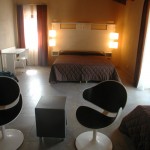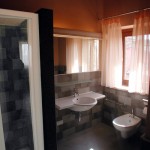 Quando andate in un albergo normale, la vostra presenza ha un costo energetico ed ambientale enorme, ben superiore a quello che avete a casa vostra.
Quando andate in un albergo normale, la vostra presenza ha un costo energetico ed ambientale enorme, ben superiore a quello che avete a casa vostra.
Fate caso all’aria condizionata, alle lampadine a incandescenza, al pessimo isolamento termico, al gran spreco d’acqua, detersivi, contenitori di plastica…
In una stanza del PER è tutta un’altra storia.
Vi spieghiamo perché.
When you stay in a normal hotel, your presence has an enormous energy cost and environmental impact: well above that of your own home.
Consider for a moment, a normal hotel’s: air-conditioning; incandescent lighting; poor insulation; excessive water wastage; detergents and the disposable plastic products that are used.
In one of PeR’s rooms it’s a completely different story: let us explain why.
Water
In this area we have many beautiful days even years, which is fortunate for you, but as farmers for centuries have known many fine days means overcoming the problem of drought.
Today, when it rains we take great care to conserve this precious resource for your comfort, please conserve water, especially in the dry season.
The tap water here is filtered rainwater, which is perfectly safe to drink, wash and brush your teeth with. However, we advise against drinking the tap water as it’s poor in salts.
We supply mineral water for you to drink. Our drinking water is bottled in glass and comes from a spring nearby.
To be hygienic it’s not necessary to waste 10 liters of clear water with every flush of the toilet. Sewage and waste water from the toilet is treated naturally and then sent underground where it becomes a fertilizer for the oak trees in the woods. Our grey water is also recaptured and recycled.
Energy
All our energy, electricity, is produced by the sun, wind and biomasses.
Light
In the places that aren’t exposed to much natural light, we have installed a series of tubes, mirrors and lenses that redirect sunlight.
All our light bulbs are low consumption and around half are LED.
Hairdryers
Our hairdryers optimize consumption. Try them; you’ll find that it takes about 10 seconds longer to dry your hair and you’re halving your energy consumption (and they wear out less often).
Refuse
The main idea at PeR is to produce the least amount of refuse as possible and recycle the refuse which is created. As you’re aware a lot of consumables, purchased in the city, are packaged in plastic. If you have children we recommend, for educational purposes, that you collect your rubbish and take it back to the city with you. If not, you can leave it in our bins and we’ll work out what to do with it.
Climate
The heating system is in the floor, and even in the severest winter, the water used in the heating system only has to be heated to 30° degrees Celsius, to keep you comfortable (normal heating systems have to be above 60°). Heat is also generated from solar panels, and, when there is not much sunlight, from biomass energy.
In summer, any areas that are exposed to the south are refreshed naturally by simply capturing the air from the north, which travels through the woods, and channeling it through a system of tubes into the underground part of the building.
The solar panels, convert the sun’s rays into energy which in a normal house would be absorbed through the walls.
The walls are well insulated (have good thermal inertia), which is discreet and creates a “wine-cellar effect” even in the upper levels of the buildings.
Acqua
Questa è una zona con molti giorni/anno di bel tempo; per voi è una fortuna, ma per i contadini, per secoli, significava aver problemi di siccità.
Oggi, quando piove, la conserviamo con cura per il vostro benessere; non sprecatela, per favore, specie nella stagione secca. L’acqua dei rubinetti è piovana filtrata e potabilizzata. Consigliamo di non berla perché è povera di sali, ma è perfettamente igienica, ad esempio per lavarsi i denti.
Per bere vi regaliamo dell’acqua minerale che viene da una fonte vicina ed è imbottigliata in vetro.
 WC
WC
La vera pulizia non è sprecare 10 litri d’acqua limpida ad ogni sciacquone; da noi lo scarico del WC è acqua grigia recuperata e riciclata.
I liquami vengono fitodepurati naturalmente nel bosco, cioè finalmente la vostra cacca va sottoterra, dove ritorna alla natura e fa da concime alle querce; in fondo è il suo mestiere.
Energia
Tutta la nostra energia elettrica e termica è prodotta con sole vento e biomasse.
Luci
Nei locali bui usiamo un sistema di tubi, specchi e lenti che porta la luce del sole.
Le lampadine sono tutte a basso consumo, circa metà sono a LED.
Asciugacapelli
Sono a consumi ottimizzati, cioè consumano molto meno di quelli normali. Provateli, vedrete che metterete poche decine di secondi in più ad asciugare i capelli (tra l’altro li stressate di meno) dimezzando i consumi.
Rifiuti
Tutto quello che trovate al PER è studiato pensando a produrre pochi rifiuti e, quei pochi, a riciclarli. Vi accorgerete che tanti beni di consumo che portate dalla città sono ricchi di plastica. Se avete dei figli, per motivi educativi, vi raccomandiamo di raccoglierli e riportarli in città. Se no, basta metterli nel cestino dei rifiuti e ci pensiamo noi.
Clima
Il riscaldamento è nel pavimento, così anche negli inverni più rigidi basta che l’acqua sia a 36 gradi per farvi stare benone (mentre quella dei termosifoni tradizionali deve essere sopra ai 60). Il riscaldamento è generato dai pannelli solari termici e, quando c’è poco sole, dalle biomasse.
D’estate si raffresca naturalmente (semplicemente sfruttando la geotermia passiva delle fondazioni) e in alcuni ambienti più esposti a sud si rinfresca in modo naturale con una presa d’aria collegata a un tubo sotterraneo che capta l’aria dal bosco esposto a nord. I pannelli solari a convertono in energia utile molte delle radiazioni solari che in una casa normale porterebbero a surriscaldare i muri. I muri ben isolati hanno una buona inerzia termica, così c’è un discreto “effetto cantina” anche al piano superiore.

